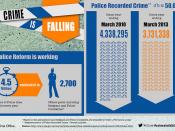When you hear the phrase white-collar crime you immediately associate it with scandals in the financial and business sector and the sophisticated frauds of senior executives. In the last 2 decades or so there have been a number of highly publicised examples of white-collar crime, including that of Robert Maxwell who defrauded his company the Mirror Group Newspapers pension funds. Criminologists have argued that crimes of this nature are more prevalent, more serious, and more damaging to society than other crimes such as street crime (Croall, 1992). Contrary to this view there have been comparatively little research and analyses of white-collar crime in conventional criminological theories, texts and journals, particularly in Britain (Levi, 1987).
Regardless of the prevalence of white-collar crime, early criminologists largely ignored it. They saw crime as a form of deviant behaviour; which itself was seen as a bi-product of poverty (which prevailed in the 18th and 19th centuries).
Marxist scholars (19th and 20th century) were of the opinion that crime was produced by an outgrowth of class conflict. White-collar crime didn't exist at this time, but the type of crimes it encompassed were theorised under the same thought as the typical crimes of those times. It was Edwin Sutherland who first put white-collar crime on the criminological agenda and ever since considerable controversy has always surrounded its definition, responses and cause (Croall, 1992). Attempts to define what is meant by white-collar crime in literature is put across in an ambiguous manner that it is unclear to what range of crimes is being referred to (Maguire, Morgan & Reiner, 2002).
Edwin Sutherland defined white-collar crime as:
'Approximately.... a crime committed by a person of respectability
and high social status in the course of his occupation'
(Sutherland, 1949, quoted by Croall, 1992:8).
Sutherland thus distinguished white-collar crime from...


